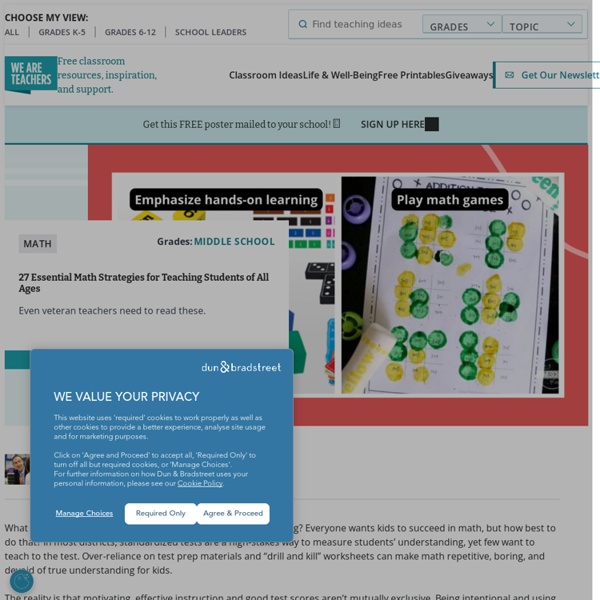Limiting “Teacher Talk,” Increasing Student Work!
“Wah waah wah waah wah wah…” We all know the famous muted trumpet of adults in Charlie Brown’s world, especially their teacher, Miss Othmar. After five years teaching elementary school, I’m confident that I’m not boring my kids to sleep but I do wonder if I strike the right balance between “teacher talk” and student work. Research has long supported the idea that students benefit from “doing.” Regular practice with reading and re-reading increases comprehension and fluency (National Reading Panel, 2000), as well as builds vocabulary and knowledge (Cunning & Stanovich, 1998).
New Math: A Guide for Parents
Are you confused by unfamiliar-looking math problems in your child’s homework? The approach to teaching math concepts has changed in recent years. The goal is to help kids gain a deeper understanding. Many of the new methods are taken from several Common Core–based curriculums. The examples in this slideshow, created with the help of math specialist Heidi Cohen, can help you help your child with “new math.” You can print a cheat sheet that contains all the examples by clicking view or download below.
Research-Based Math Instructional Strategies - MIDDLE SCHOOL MATTERS
Mathematics includes a set of knowledge and skills used to access science, technology, engineering, and mathematics (STEM) applications and careers as well as a tool for improving reasoning and analytic thinking. Effective math instructional strategies include using manipulatives to introduce mathematics concepts and applying systematic strategies for solving word problems. Overview of Math Principles and Practices Principle 1: Establish schoolwide practices for enhancing mathematics understanding within relevant content area instruction. Practice 1: Encourage students to apply their understanding of mathematics concepts and procedures to draw conclusions and propose solutions about history, science, social studies, economics, and other content areas.Practice 2: Ask students to analyze events and phenomena from a quantitative perspective and use their analyses to develop arguments and provide just cations.
"Student-Centered" vs "Traditional" Math Teaching
I’d like to reframe the divide that seems to exist when we talk about “student-centered teaching” and “traditional teaching.” Instead, I suggest that we use these labels to describe, without blanket judgment, two different kinds of teaching decisions, each with its own purpose and value. To me, “student-centered teaching” relates to lessons where I offer students experiences to figure things out for themselves. “Traditional teaching” is when I present information to students that I’d like them to learn. I use both approaches in my teaching all the time, but I’m mindful about when I choose each.
8 Awesome Math Help Blogs from Teachers to Help Your Student - Magoosh Math
When you want to provide math help to your student, you want the best resources available. The Internet has lots of great resources, including blogs that provide helpful explanations, practice problems with step-by-step guides, and more. If you’re looking for the best math help blogs that teachers use, check out these 8 great options.
Modern Strategies for Teaching Middle School Math
As any teacher or parent of a middle school student knows, there are shifts in attitudes and behaviors with the onset of adolescence. Understanding why these shifts happen can help us to better support students through what can be a challenging emotional and physical time. To reach and teach the middle school math mind, understanding its inner workings and leveraging current best practices just makes sense. This white paper provides answers to who middle school students are, how they learn, and classroom strategies to make sure they stay engaged at this critical time of change. You’ll learn more about how to nurture the middle school mind in the math classroom and how your students’ minds work when it comes to: Emotional Development of Middle School Students
Tips for Teachers: Critical ingredients for a successful mathematics lesson
What are the ingredients for an effective mathematics lesson? Teachers are continually faced with a range of advice or ideas to improve their mathematics lessons and often this just creates confusion. It’s a little bit like being a cook. New recipes appear online and in cookbooks on bookstore shelves, but often they’re just adaptations of classic recipes that have been around before, their foundation ingredients are tried and tested, and often evidence based. There are always the staple ingredients and methods that are required for the meal to be successful. The following is a list of what I consider to be important ingredients when planning and teaching an effective mathematics lesson.
Awesome Library - Mathematics - Elementary School Math
Here: Home > Classroom > Mathematics > Elementary School Math Sub-Topics Kindergarten1st Grade2nd Grade3rd Grade4th Grade5th Grade6th GradeAddition Subraction Multiplication DivisionAlgebraArithmeticBy Grade and StandardData AnalysisDecimals and FractionsGamesGeometryGraphingMeasurementPre-AlgebraPrime NumbersProbability and StatisticsAlso TryDiscussions Ask Dr. Math (Math Forum) Provides organized structure for gaining answers. Math Mentors for Elementary School Students (Math Forum) Provides elementary school students with assistance on math problems submitted.
Instructional Strategies
Instructional Strategies Mathwire.com Topics Active Participation These strategies support active student participation in math lessons and allow teachers to assess the developing proficiency levels of all students in the class by walking around to monitor student responses. These strategies are especially effective during the Mental Math part of an Everyday Mathematics lesson. Use white boards: Give each student a white board, dry erase marker and an eraser.



